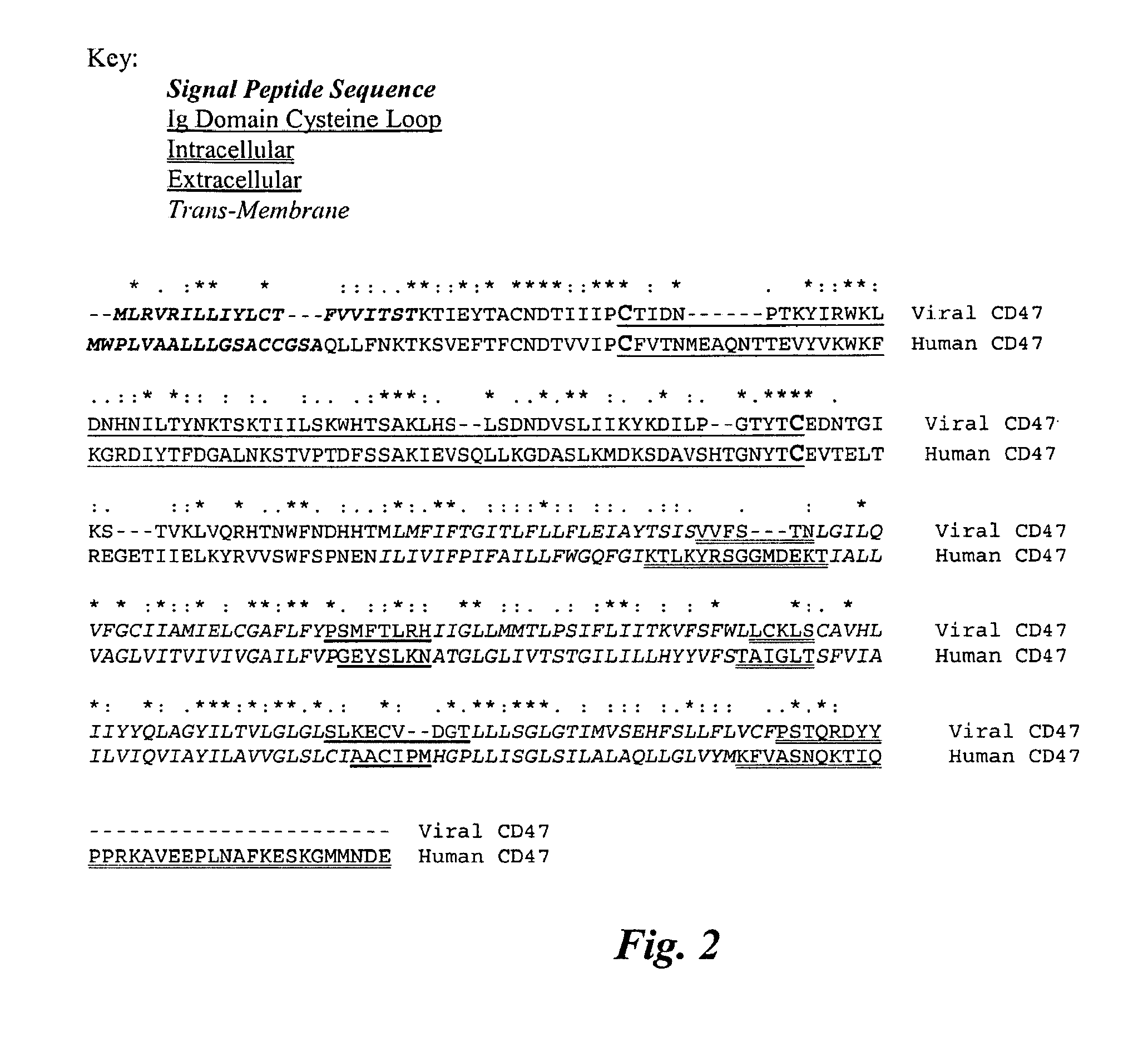CD47 related compositions and methods for treating immunological diseases and disorders
a technology of immunological diseases and disorders, applied in the field of fusion polypeptides, can solve the problems of affecting the productivity, well-being, general health of patients,
- Summary
- Abstract
- Description
- Claims
- Application Information
AI Technical Summary
Benefits of technology
Problems solved by technology
Method used
Image
Examples
example 1
Inhibition of Staphylococcus aureus Cowan Strain (SAC)-Induced Cytokine Production in Human Dendritic Cells by a Human CD47-Fc Polypeptide
[0271]As described herein, a cognate ligand of CD47 is the signal-regulator protein alpha (Sirp-α) (see also, e.g., Latour et al., J. Immunol. 167:2547-54 (2001)). The capability of a huCD47 extracellular domain-Fc polypeptide construct to inhibit Staphylococcus aureus cell (SAC)-induced cytokine production in human monocyte derived dendritic cells is described in this example.
[0272]The human CD47 extracellular domain fused to a human IgG Fc polypeptide was prepared using molecular biology methods and techniques and protein expression methods and techniques with which persons skilled in the art are familiar. The amino acid sequence of the human CD47 extracellular domain Fc polypeptide used in these examples is provided in SEQ ID NO:2. The polypeptide sequence of the CD47 extracellular domain is provided in SEQ ID NO:11 (with the signal peptide) an...
example 2
Inhibition of Immune Complex-Induced Cytokine Production in Human Dendritic Cells by a Human CD47-Fc Polypeptide
[0281]Antigen-antibody complexes (i.e., immune complexes) can damage tissue by triggering Fc-receptor mediated inflammation, a process implicated in a variety of human diseases such as systemic lupus erythematosus, rheumatoid arthritis, and Sjoergen's syndrome. The effect of hCD47-Fc on immune complex (IC)-mediated inflammation was determined using in vitro assays that were developed to mimic IC-mediated cytokine induction in human dendritic cells by modifying previously described methods (see, e.g., Boruchov et al, J. Clin. Invest. 115:2914-23 (2005)). Dendritic cells (DC) were activated with IFN-γ and low dose of Toll like receptor (TLR) ligands (for example, FSL-1 or LPS) to resemble DC in inflamed tissue.
[0282]96 well plates were coated with 50 μl per well of 50 μg / ml anti-human Fc donkey IgG (Jackson ImmunoResearch Laboratories, West Grove, Pa.) in 0.1 M NaHCO3 / Na2CO3...
example 3
Inhibition of IgG-Induced Cytokine Production in Human Dendritic Cells by a Human CD47 Fusion Polypeptide Dimer
[0284]This Example describes the capability of a human CD47 extracellular domain fusion polypeptide dimer to inhibit IgG-mediated cytokine production in human dendritic cells.
[0285]A fusion polypeptide comprising the extracellular domain of human CD47 fused to a non-immunoglobulin moiety. As described herein, a fusion polypeptide dimer may form via the CD47 moieties of a fusion polypeptide, which are capable of forming an interchain disulfide bond. The non-immunoglobulin moiety fused to the CD47 moiety is referred to as a Hac moiety and comprises an hemagglutinin (HA) binding site, C-TAG (protein C-tag derived from the heavy chain of human protein C), and two streptavidin binding sites (2×SBP) (see, e.g., SEQ ID NO:34 sets forth the amino acid sequence of the HAC moiety, wherein the HA epitope is located at the amino terminal end of the Hac moiety fused to a C-TAG, which is...
PUM
| Property | Measurement | Unit |
|---|---|---|
| pH | aaaaa | aaaaa |
| dissociation constant KD | aaaaa | aaaaa |
| molecular weight | aaaaa | aaaaa |
Abstract
Description
Claims
Application Information
 Login to View More
Login to View More - R&D
- Intellectual Property
- Life Sciences
- Materials
- Tech Scout
- Unparalleled Data Quality
- Higher Quality Content
- 60% Fewer Hallucinations
Browse by: Latest US Patents, China's latest patents, Technical Efficacy Thesaurus, Application Domain, Technology Topic, Popular Technical Reports.
© 2025 PatSnap. All rights reserved.Legal|Privacy policy|Modern Slavery Act Transparency Statement|Sitemap|About US| Contact US: help@patsnap.com



